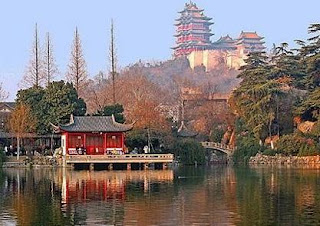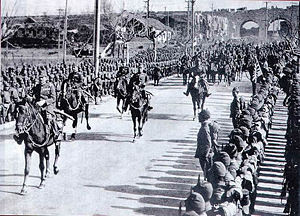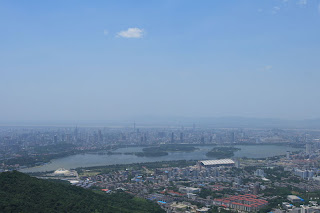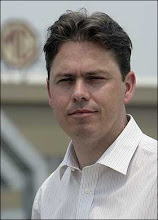I am sure that I will receive a barrage of complaints for even suggesting that a defunct British motor company could be responsible for raising such an important Chinese city’s profile – but you have to ask the question – how many people in the UK (I will stick to the UK as I cant answer the rest of the western hemisphere) had ever heard of Nanjing before MG moved here?
I have had this conversation with many people, from various countries, different religions and social backgrounds, and It seems clear that although few will admit to never having heard of Nanjing before; they all agree that MG has certainly raised the city’s profile over the last 12-18 months.
I even dared to suggest this scenario to a reporter for the local English magazine in Nanjing called ‘MAP’, I felt that the play on words would provide a great headline, and an interesting story for locals to debate “MG puts Nanjing on the MAP?” my ears are still ringing from the torrent of abuse she hurled at me for even thinking such a thing.
In my defense I can only put my ignorance down to a poor upbringing, and an even poorer education system, if only I had worked harder at school, widened my understanding of Chinese history, and maybe read a little more – I wouldn’t fall into the bracket of an ‘ill educated, small minded buffoon” as suggested by the same reporter!
So I guess if they wont report the story, then at least I can pose the question to those of you who read my BLOG.
From the people I have spoken to (excluding any Chinese friends) the main split seems to be those who consider themselves ‘intellectuals’ these have had a classical upbringing, and of course recognized Nanjing for its Chinese political, social and historical importance over the past 2500 years. Then there are those (including myself) who may have heard something about the atrocities suffered by the people of Nanjing during the Japanese invasion of 1937, although I have to admit that I only knew of this due to a previous trip to Shanghai, when I asked the question why a group of Chinese Students were jumping up and down on a Toyota Camry!
And finally the group of people who had unfortunately never heard of the city before Nanjing’s involvement in the purchase of MG-Rover’s assets?
So to put the record straight I wanted to give you a potted history of Nanjing, and perhaps let a few people know why the reporter looked at me as if I had just had a double lobotomy!
 The history of Nanjing (and China for that matter) goes back a very long way! In fact fossils of Homo sapiens have been found in the eastern suburbs of Nanjing that date back to the mid-Pleistocene period, some 350,000 years ago, and it is thought to be the home of some of the earliest inhabitant on Earth!
The history of Nanjing (and China for that matter) goes back a very long way! In fact fossils of Homo sapiens have been found in the eastern suburbs of Nanjing that date back to the mid-Pleistocene period, some 350,000 years ago, and it is thought to be the home of some of the earliest inhabitant on Earth!
One of the reasons we may not have heard of Nanjing, maybe be because it has been called by various names in the past, including: Jinling, Jianye, Jiankang, Jiangning and Tianjing. Its current name Nanjing means South Capital – and as the name suggests – it has been the capital city during some of the most significant periods in China’s history.
It first became a city around 472 B.C. under the supervision of Minister Fan Li, and in A.D. 229 Emperor Sun Quan of the Wu Kingdom made Nanjing his Capital. It reigned as capital city during Eastern Jin, Song, Qi, Liang and Chen Dynasties from 317 – 589 A.D. earning the city its fame as the “ancient capital of six dynasties”.
Following this, Nanjing once again became the political center of China in 1368 when Zhu Yuanzhang founded the Ming Dynasty, he also spent 21 years building the 33.65 kilometer wall that surround the ancient city limits, and created what was the largest city in the world at that time.

Nanjing’s most important modern era was when Dr. Sun Yat-Sen established the Republic of China, and made it the capital city in 1928. Although the next decade would see a very turbulent part of Nanjing’s history that was defined by the Japanese invasion in 1937, and the subsequent massacre of c300, 000 innocent Nanjing inhabitants over a 6 week period.
The capital city changed hands a couple of times during the War, with Nanjing again becoming the capital as late as 1945 to 1949. Following this, Beijing regained the capital city status during the commencement of the Peoples Republic of China, and leaving Nanjing as the capital of Jiangsu province.
 Nanjing is now known as a special tourist attraction for most of China, and the local population swells during the national holidays. The most visited areas are based around the purple mountain, and include the impressive mausoleums of Emperor Sun Quan, Zhu Yuanzhang and Dr Sun Yat-Sen, the remains of the great wall that surrounded the city, the memorial to those that died during the Japanese massacre and countless historical gardens and houses. Stand on the top floor of the Nanjing Train Station in the early evening, and the view is amazing, to your left is the imposing Purple Mountain, directly in front the fading sunlight reflects off the enormous Xuanwu Lake onto the rising skyline of a booming city.
Nanjing is now known as a special tourist attraction for most of China, and the local population swells during the national holidays. The most visited areas are based around the purple mountain, and include the impressive mausoleums of Emperor Sun Quan, Zhu Yuanzhang and Dr Sun Yat-Sen, the remains of the great wall that surrounded the city, the memorial to those that died during the Japanese massacre and countless historical gardens and houses. Stand on the top floor of the Nanjing Train Station in the early evening, and the view is amazing, to your left is the imposing Purple Mountain, directly in front the fading sunlight reflects off the enormous Xuanwu Lake onto the rising skyline of a booming city. 
I guess I shouldn’t really be debating how influential the purchase of the MG brand has been to the profile of Nanjing, even if it has – is this such a bad thing? If a positive episode in a city’s history enlightens more people to that history and culture then this must surely be good? Even if it has inspired just one person to Google Nanjing or borrow a book from the local library, then that can only be seen as positive. Don’t get me wrong I am in no way suggesting that this is an important milestone In the history of the city, all I am suggesting is that this has enabled a few more people to become aware of this wonderful and colorful Eastern Chinese capital.
Maybe those that are least sensitive to this issue, are those in the local government, speaking with the many representatives I have met at various functions, they all express just how important this has been to the development of the area, and the knock on effect it is, and will continue to have in terms of both commercial and tourism activities.I remember doing a live interview with BBC World Service, about the MG Project, and as I put the headphones on to hear the interviewer – they said to me, “don’t worry there are only 120million people listening!” – maybe that 53 million pounds looks like a pretty good investment after all?

I have had this conversation with many people, from various countries, different religions and social backgrounds, and It seems clear that although few will admit to never having heard of Nanjing before; they all agree that MG has certainly raised the city’s profile over the last 12-18 months.
I even dared to suggest this scenario to a reporter for the local English magazine in Nanjing called ‘MAP’, I felt that the play on words would provide a great headline, and an interesting story for locals to debate “MG puts Nanjing on the MAP?” my ears are still ringing from the torrent of abuse she hurled at me for even thinking such a thing.
In my defense I can only put my ignorance down to a poor upbringing, and an even poorer education system, if only I had worked harder at school, widened my understanding of Chinese history, and maybe read a little more – I wouldn’t fall into the bracket of an ‘ill educated, small minded buffoon” as suggested by the same reporter!
So I guess if they wont report the story, then at least I can pose the question to those of you who read my BLOG.
From the people I have spoken to (excluding any Chinese friends) the main split seems to be those who consider themselves ‘intellectuals’ these have had a classical upbringing, and of course recognized Nanjing for its Chinese political, social and historical importance over the past 2500 years. Then there are those (including myself) who may have heard something about the atrocities suffered by the people of Nanjing during the Japanese invasion of 1937, although I have to admit that I only knew of this due to a previous trip to Shanghai, when I asked the question why a group of Chinese Students were jumping up and down on a Toyota Camry!
And finally the group of people who had unfortunately never heard of the city before Nanjing’s involvement in the purchase of MG-Rover’s assets?
So to put the record straight I wanted to give you a potted history of Nanjing, and perhaps let a few people know why the reporter looked at me as if I had just had a double lobotomy!
 The history of Nanjing (and China for that matter) goes back a very long way! In fact fossils of Homo sapiens have been found in the eastern suburbs of Nanjing that date back to the mid-Pleistocene period, some 350,000 years ago, and it is thought to be the home of some of the earliest inhabitant on Earth!
The history of Nanjing (and China for that matter) goes back a very long way! In fact fossils of Homo sapiens have been found in the eastern suburbs of Nanjing that date back to the mid-Pleistocene period, some 350,000 years ago, and it is thought to be the home of some of the earliest inhabitant on Earth!One of the reasons we may not have heard of Nanjing, maybe be because it has been called by various names in the past, including: Jinling, Jianye, Jiankang, Jiangning and Tianjing. Its current name Nanjing means South Capital – and as the name suggests – it has been the capital city during some of the most significant periods in China’s history.
It first became a city around 472 B.C. under the supervision of Minister Fan Li, and in A.D. 229 Emperor Sun Quan of the Wu Kingdom made Nanjing his Capital. It reigned as capital city during Eastern Jin, Song, Qi, Liang and Chen Dynasties from 317 – 589 A.D. earning the city its fame as the “ancient capital of six dynasties”.
Following this, Nanjing once again became the political center of China in 1368 when Zhu Yuanzhang founded the Ming Dynasty, he also spent 21 years building the 33.65 kilometer wall that surround the ancient city limits, and created what was the largest city in the world at that time.

Nanjing’s most important modern era was when Dr. Sun Yat-Sen established the Republic of China, and made it the capital city in 1928. Although the next decade would see a very turbulent part of Nanjing’s history that was defined by the Japanese invasion in 1937, and the subsequent massacre of c300, 000 innocent Nanjing inhabitants over a 6 week period.
The capital city changed hands a couple of times during the War, with Nanjing again becoming the capital as late as 1945 to 1949. Following this, Beijing regained the capital city status during the commencement of the Peoples Republic of China, and leaving Nanjing as the capital of Jiangsu province.
 Nanjing is now known as a special tourist attraction for most of China, and the local population swells during the national holidays. The most visited areas are based around the purple mountain, and include the impressive mausoleums of Emperor Sun Quan, Zhu Yuanzhang and Dr Sun Yat-Sen, the remains of the great wall that surrounded the city, the memorial to those that died during the Japanese massacre and countless historical gardens and houses. Stand on the top floor of the Nanjing Train Station in the early evening, and the view is amazing, to your left is the imposing Purple Mountain, directly in front the fading sunlight reflects off the enormous Xuanwu Lake onto the rising skyline of a booming city.
Nanjing is now known as a special tourist attraction for most of China, and the local population swells during the national holidays. The most visited areas are based around the purple mountain, and include the impressive mausoleums of Emperor Sun Quan, Zhu Yuanzhang and Dr Sun Yat-Sen, the remains of the great wall that surrounded the city, the memorial to those that died during the Japanese massacre and countless historical gardens and houses. Stand on the top floor of the Nanjing Train Station in the early evening, and the view is amazing, to your left is the imposing Purple Mountain, directly in front the fading sunlight reflects off the enormous Xuanwu Lake onto the rising skyline of a booming city. 
I guess I shouldn’t really be debating how influential the purchase of the MG brand has been to the profile of Nanjing, even if it has – is this such a bad thing? If a positive episode in a city’s history enlightens more people to that history and culture then this must surely be good? Even if it has inspired just one person to Google Nanjing or borrow a book from the local library, then that can only be seen as positive. Don’t get me wrong I am in no way suggesting that this is an important milestone In the history of the city, all I am suggesting is that this has enabled a few more people to become aware of this wonderful and colorful Eastern Chinese capital.
Maybe those that are least sensitive to this issue, are those in the local government, speaking with the many representatives I have met at various functions, they all express just how important this has been to the development of the area, and the knock on effect it is, and will continue to have in terms of both commercial and tourism activities.I remember doing a live interview with BBC World Service, about the MG Project, and as I put the headphones on to hear the interviewer – they said to me, “don’t worry there are only 120million people listening!” – maybe that 53 million pounds looks like a pretty good investment after all?



4 comments:
All this englishman's view of Chinese is culture is fine but can you get back to topic. We're into the last 30 - 40 days before launch and I can see from images of the MG quality tour that production is ramping up. Can give your account of that tour and other "manufacture blogs" during this countdown.
Thanks
Wasequiped
(mg-Rover.org)
Also noteworthy:
Likely frightened by the growing intrusions of pirates along the coasts and well into the Yangzi Delta, Ming Emperor Yongle moved the capital to Beijing in 1421.
I think its a nice try to claim ownership of bringing fame to a place,especially for advertising purposes, but you might find that people have heard of Nanking, spelled with a "k". The first few linguists who tried to romanize chinese came up with a system that allowed the "k" to sound like a voiced "ch" (j) sound or as it is spelled today, "Nanjing." Even the older locals will sometimes refer to it as Nanking instead of Nanjing when talking to foreigners. But this is just my two cents.
nice post. thanks.
Post a Comment